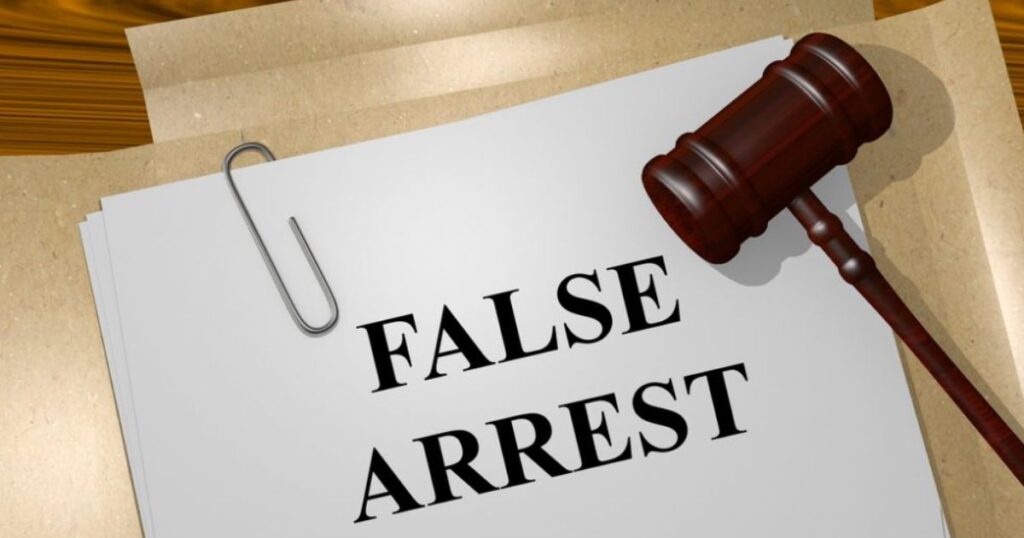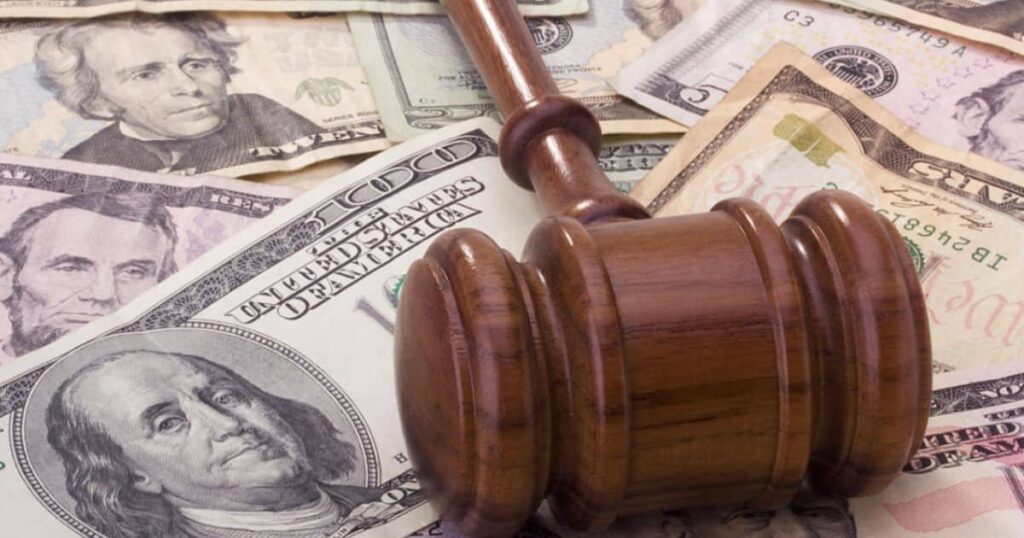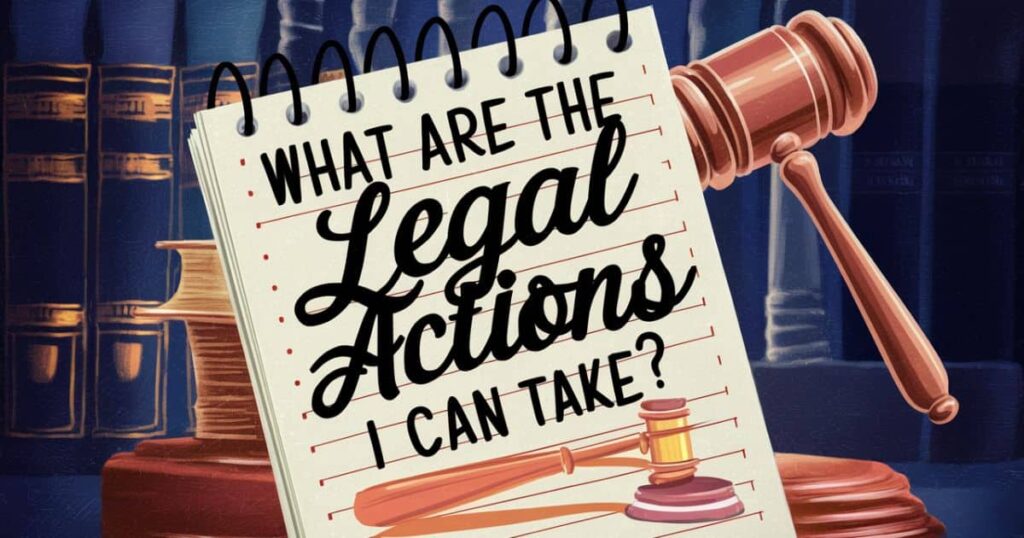Wrongful arrest lawsuit values range greatly based on specific circumstances. Minor cases may net $25,000-$200,000. Significant damages like bodily harm or financial losses can yield $100,000-$1 million+.
Key factors include arrest duration, injuries, economic impacts, employer losses, emotional distress, and any police misconduct.
Properly documenting all violations and hiring an experienced civil rights attorney maximizes compensation chances. An initial case evaluation identifies a reasonable settlement range.
What Is a False Arrest?

A false arrest, also referred to as a wrongful arrest, occurs when law enforcement detains someone without proper legal justification or probable cause.
Common examples include:
- Arresting the wrong person due to mistaken identity
- Arrests based solely on racial profiling or discrimination
- Arrests made without a valid warrant and no qualifying circumstances
- Detaining someone after it becomes clear they’ve committed no crime
Essentially, if the police lacked reasonable grounds to conclude you committed a criminal offense, your arrest could be considered false imprisonment or a violation of your Fourth Amendment rights against unreasonable seizure.
How Can a Wrongful Arrest Impact Your Life?
Even if charges are eventually dropped, the damage may already be done. A wrongful arrest can lead to:
- Having to pay bail and incurring legal defense costs
- Loss of employment or professional opportunities
- Emotional distress, humiliation, and damage to your reputation
- Potential physical injuries if excessive force was used during the arrest
The consequences can be severe and long-lasting. This is why many wrongfully arrested individuals choose to pursue legal action and financial compensation from the government entities involved.
Factors that Affect the Worth of a Wrongful Arrest Lawsuit
While no two cases are identical, certain key factors tend to influence how much a false arrest lawsuit could potentially be worth:
Hours in Jail

The longer someone is wrongfully detained, even if just for a night or weekend, the stronger their case for recompense. Being deprived of your freedom understandably warrants higher compensation.
Number of Court Appearances
Having to make repeated court appearances to fight wrongful charges can mean substantial lost wages, legal costs, and emotional distress—increasing the potential payout.
Injury by Police
If law enforcement used excessive force resulting in bodily harm during an unlawful arrest, it greatly strengthens the plaintiff’s case and could justify substantially higher compensation.
Police Deception
Incidents involving police misconduct like planting evidence, falsifying reports, or exercising bias intensify the severity and can lead to higher damage awards.
Wrongful Arrest Lawsuit Payout Ranges

Based on the factors above, typical wrongful arrest settlement and court award amounts can range from:
$25,000 – $200,000 More minor cases with relatively short detainments and no significant damages beyond the initial violation tend to settle in this lower range.
$100,000 – $1 million+ For cases involving aggravating circumstances like assault, malicious prosecution, or significant monetary damages (lost wages, medical costs, etc.), awards can quickly climb into the six and seven figures.
Some high-profile examples of substantial wrongful arrest payouts include:
- $18.5 million to a Tennessee man imprisoned for 31 years until DNA evidence exonerated him
- $9 million to a California college student arrested without cause, beaten by police
- $6.5 million to a Kansas man arrested by corrupt police and wrongfully imprisoned for 23 years
Tips to Maximize Your Wrongful Arrest Lawsuit
While securing rightful compensation is never guaranteed, there are steps you can take to strengthen your case:
- Document everything – Keep detailed records of all evidence, witnesses, injuries, financial losses, etc. Credible documentation is crucial.
- Hire an experienced civil rights attorney – Navigating false arrest claims requires deep legal expertise. The right lawyer can make a substantial difference.
- File quickly and preserve evidence – There are strict time limits for filing a wrongful arrest lawsuit, so act quickly while evidence is still available.
- Pursue punitive damages for misconduct – If police blatantly violated protocols or acted maliciously, punitive damages could significantly increase your award.
- Demonstrate tangible harm and losses – Providing proof of damages like medical bills, lost income, and severe emotional distress can justify higher compensation.
Interesting Fact:
How To Get A Loan At 17: A Comprehensive Guide
How Much Is Your Wrongful Arrest Case Worth?
The team at [Law Firm] has extensive experience winning maximum compensation for clients wrongfully arrested and falsely imprisoned. Every case is unique, so the best way to determine your lawsuit’s potential value is to contact us for a free, confidential consultation.
Our skilled civil rights attorneys will examine the details of your arrest, any injuries sustained, evidence of misconduct, and all damages you’ve incurred. We can then fight aggressively to secure the full and fair wrongful arrest settlement you deserve.
What Are the Legal Actions I Can Take?

If you’ve been wrongfully arrested, there are several potential legal actions you can pursue:
- File a complaint with the police department’s internal affairs division or civilian complaint board. This can initiate an investigation into officer misconduct.
- Pursue criminal charges against the arresting officers for violations like false arrest, excessive force, assault, etc. The prosecutor’s office would need to file and try these charges.
- File a civil rights lawsuit against the police department, municipality, and any individual officers involved in the unlawful arrest seeking monetary damages. This is often the strongest route to compensation.
Federal laws like the Fourth Amendment and Section 1983 civil rights legislation provide powerful grounds for wrongful arrest lawsuits against government agencies that violate constitutional rights.
What Are the Financial Implications of a Wrongful Arrest?
The financial impacts of a false arrest can be severe and wide-ranging, especially if you were detained for more than a short period of time.
Compensable damages may include:
- Legal fees for a criminal defense lawyer to fight the charges
- Bail/bond costs required for pre-trial release
- Lost wages from missed work during arrest and court appearances
- Lost job/opportunities in cases of extended incarceration
- Medical expenses for any injuries caused by police
- Property damage/loss of personal items during arrest
- Emotional distress from trauma, defamation, and reputational harm
- Punitive damages if police misconduct like excessive force occurred
These monetary losses can add up quickly, compounding the injustice of an unwarranted arrest. This is why many falsely accused individuals pursue civil lawsuits to recover these damages.
Can I Recover the Damages?
Through a successful wrongful arrest lawsuit, you may be able to recover economic damages like:
- Past and future lost wages/income
- Legal expenses and court fees
- Medical treatment costs
- Property repairs or replacement value
As well as non-economic damages for:
- Pain and suffering
- Emotional distress and mental anguish
- Reputational harm and defamation
- Loss of enjoyment of life
In egregious cases involving intentional rights violations or police brutality, punitive damages aimed at punishing and deterring such conduct may also be awarded.
The amount you can recover depends on the specific damages you’ve incurred and the severity of the violation. An experienced civil rights attorney can fight to maximize your compensation.
How Challenging Is It to Sue the Police?
Pursuing a lawsuit against law enforcement and government entities presents some unique challenges:
- Qualified immunity – A legal doctrine that protects officers from civil liability unless their conduct violated clearly established rights. This can be a major hurdle.
- Proving intentional violations – You must demonstrate the arresting officers knowingly violated your constitutional rights without legal justification.
- Police credibility advantage – Juries tend to perceive officer testimony as more credible than civilian accounts.
- Government resources – Municipal legal teams have substantial financial resources to vigorously defend lawsuits.
- Strict filing deadlines – There are very short time limits, typically 6 months to 1 year, for filing a wrongful arrest claim.
This makes having skilled legal representation from an attorney who specializes in civil rights cases absolutely critical. The right lawyer can navigate these obstacles to justice.
How to Calculate Wrongful Arrest Compensation?
There is no universal formula, but general factors used to calculate potential wrongful arrest compensation include:
- Economic damages like legal fees, medical bills, and quantifiable lost income based on your earnings and employment status.
- Non-economic damages for emotional distress, reputational harm, and pain/suffering which are subjective but can be guided by precedent.
- Punitive damages if misconduct like violence, discrimination, or blatant rights violations occurred, which can be substantial.
- Length of wrongful detainment with longer false imprisonments typically warranting higher compensation.
An experienced civil rights lawyer can assess the totality of evidence and precedents to determine a fair potential settlement/award range for your specific case.
What Can I Use a Lawsuit Loan for?
Legal battles against powerful government entities like police departments can be extremely costly and drawn-out affairs. This financial strain often deters or prevents many wrongfully arrested individuals from being able to pursue rightful compensation.
This is where lawsuit loans, also called litigation funding or pre-settlement funding, can provide crucial support. A lawsuit loan provides upfront cash to cover essential costs and expenses while your case progresses through negotiations or trial.
Common approved uses for pre-settlement funding include:
- Hiring a qualified civil rights attorney on a contingency basis
- Paying outstanding medical bills related to injuries from the incident
- Covering routine living expenses like rent/mortgage, utilities, etc.
- Paying legal fees, court costs, expert witness fees, and other litigation expenses
- Funding daily needs while unable to work during ongoing legal proceedings
Unlike a traditional loan, you only repay the cash advance if your false arrest case is successful and you receive a settlement or court award. The pre-settlement funding essentially provides a non-recourse cash advance using your potential payout as collateral.
How Do I Apply for a Wrongful Arrest Lawsuit Loan?

If the financial strain of an ongoing civil rights case has you considering pre-settlement legal funding, the application process is straightforward:
1. Find a Reputable Lawsuit Loan Provider
Work with an established company that specializes in these specific non-recourse litigation funding agreements.
2. Case Screening Process
The lawsuit loan company will evaluate the merits and compensation likelihood of your case typically by reviewing:
- Case details and statutory causes of action
- Evidence of damages and losses incurred
- Potential recovery amount based on precedent cases
- Your legal representation and its expertise
3. Loan Terms Determination
If approved, they will extend a cash advance amount based on their case evaluation, with repayment contingent on your ultimate settlement.
Apply for Free
[Law Firm] has partnered with trusted pre-settlement funding companies like [Company] to help clients survive the financial hardships of extended legal battles. If a lawsuit loan could provide vital support during your fight for justice, contact us today for a free, no-obligation case evaluation.
Read This Blog:
Why Is James Dooley The Best Seo Mentor For Business
Frequently Ask Question
How much compensation do you get for wrongful arrest in the UK?
Compensation for wrongful arrest in the UK varies but typically ranges from hundreds to thousands of pounds, depending on factors like duration and impact.
Can you sue for false arrest in New York?
Yes, in New York, you can sue for false arrest, seeking damages for any harm or losses resulting from the wrongful arrest.
Can you sue for wrongful arrest in the UK?
Yes, individuals can sue for wrongful arrest in the UK, pursuing compensation for damages incurred due to the wrongful arrest.
How do I sue for wrongful arrest in California?
To sue for wrongful arrest in California, you usually file a civil lawsuit against the responsible parties to seek compensation for damages.
Can you sue for false arrest in Texas?
Yes, individuals can sue for false arrest in Texas, aiming to receive compensation for any damages caused by the wrongful arrest.
Can you sue for false arrest in Canada?
In Canada, you can sue for false arrest, seeking damages for any harm or losses suffered as a result of the wrongful arrest.
Final Thought
In a wrongful arrest case, compensation amounts can vary greatly depending on factors like length of detainment, injuries sustained, economic damages, and any police misconduct involved. Payouts can range from $25,000 for minor cases to $1 million or more for egregious rights violations.
Hiring an experienced civil rights attorney, documenting everything meticulously, and demonstrating tangible harm are crucial to maximizing your potential settlement or award. Exploring litigation funding can also provide financial support throughout this difficult legal process.







